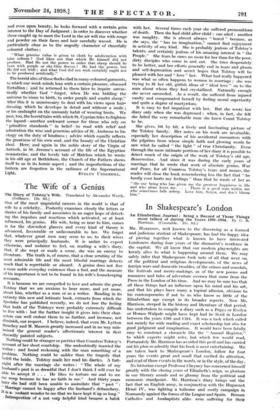The Wife of a Genius
The Diary of Tolstoy's Wife. Translated by Alexander Worth. (Gollancz. 12s. W.)•ONE of the most un. grateful careers in the world is that of
wife to a celebrity. Posterity examines closely the letters or diaries of his family and associates in an eager hope of detect- ing the impulses and reactions which activated, or at least influenced, his genius. His wife, being so near to him, comes in for the shrewdest glances and every kind of theory is advanced, favourable or unfavourable to her. We forget that, whatever great men may seem to us, to their wives they were principally husbands. It is unfair to expect otherwise, and unfairer to feel, on reading a wife's diary, that, if she wept or made a scene, she was an enemy to literature. The truth is, of course, that a close scrutiny of the
most admirable life and the most blissful marriage detects much that is regrettable or absurd. A genius does not live a more noble everyday existence than a fool, and the measure of his importance is not to be found in his wife's housekeeping accounts.
It is because we are compelled to love and admire the great Tolstoy that we are anxious to hear more, and yet more, about him, whether as a man or as a writer. Reading in its entirety this new and intimate book, extracts from which the Spectator has published recently, we do not lose the feeling that both of the Tolstoys were probably extremely difficult to live with : but the further insight it gives into their char- acters can well endear them to us further, and increase, not diminish, our respect. I believe, indeed, that even Mr. Lytton Strachey and M. Maurois greatly increased and in no way min- imized the general reader's affectionate interest in their shrewdly painted subjects.
Nothing could be stranger or prettier than Countess Tolstoy's account of her short courtship. She undoubtedly married the writer : and found reckoning with the man something of a Problem. Nothing could be sadder than the tragedy that befell the bride. Tolstoy made her read his diaries. A fort- night after the marriage she writes : " The whole of my husband's past is so dreadful that I don't think I will ever be able to accept it . He likes to torture me and to see The Weep because he has no faith in me." And thirty years later she had still been unable to assimilate that' past " : " Marriage cannot be happy after the husband's debauchery. It is a. Instant wonder to me that we have kept it up so long." - Introspection of a not very -helpful kind became a- habit with her. Several times each year she suffered premonitions of death. Then she had child after Child : one ailed : another was naughty. She is almost always " bored " because, as she says, she " has no imagination," cannot find enjoyment in activity of any kind. She is probably jealous of Tolstoy's talents, and certainly jealous of his amazing interest in " the People." She fears he cares no more for her than for the poor, dirty disciples who come in and out. She tries desperately to be better, and her-efforts generally end in tears and gloom and' self-deprecation and secret hopes that Tolstoy will be pleased with her and "love " her. What had really happened was what so often happens to women' in marriage : she was trying to fit her old, girlish ideas of " ideal love " on to -the man about whom they had crystallized. Naturally enough she -never succeeded. As a result, she suffered from- injured vanity and compensated herself .by feeling -moral superiority and quite a degree of martyrdom.
It is easy to feel impatient with her. But she wrote her diary only when she- was depressed :• when, in fact, she felt she failed the very remarkable man she knew Count Tolstoy to be.
She gives, bit by bit, a lively and fascinating picture of the Tolstoy family. Her notes on his work are invaluable, especially her description of his accidental encounters with the pilgrims from whose simple faith and glowing words he saw what he called " the light " of true Christianity. Even through the more intimate portions of her diary it is possible to detect much of the origin of the work of Tolstoy's old age, Resurrection. And since it was during the early years of marriage that he wrote that work of absolute genius, War and Peace, for all Countess Tolstoy's tears and moans, the reader will close the book remembering less the fact that " he hardly ever hurts my feelings" than that he wrote of her as
" the one being who has given me the greatest happiness in life and who alone loves me. . . . There is a gocd man within me who sometimes falls asleep. Love him, Sonya, and don't blame him."


















































 Previous page
Previous page